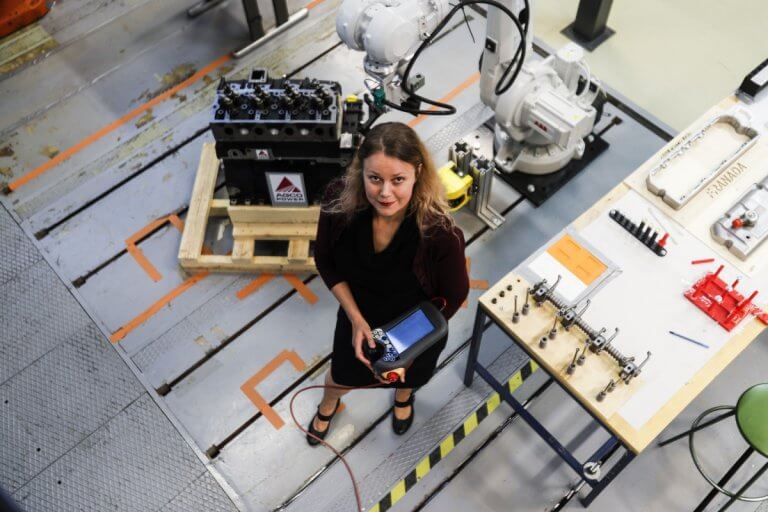
If you’re searching for a Doctoral school with a difference, Tampere University of Technology (TUT) is an incredible place to start.
Conducting innovative research in the fields of technology and architecture, TUT attracts an international scientific community of changemakers to its Hervanta campus in Tampere.
Globally-recognised for boosting industrial competitiveness, TUT Doctoral School of Industry Innovations is the ideal hub for any student looking to develop strong business skills, as well as those wanting to delve deeper into the latest innovation methods.
This school is no stranger to excellence in research, meaning there are plenty of internationally-funded projects and schemes for you to get involved with. In fact, three TUT research groups for Inverse Problems Research, Computational Nanoscience and Biomembrane Research were granted Centre of Excellence status by the Academy of Finland.
As a distinguished institution, the Doctoral School fuses three core elements; the first is its high-standard academic research, the second is its passion for innovation mixed and impressive people skills, the third is its drive to tackle contemporary business challenges in today’s everchanging industries.
Through systematic and long-term industry collaboration, TUT staff and students apply what they’ve learned to everyday situations and establish resolutions to some of the planet’s most complex issues. Hard work, determination and exposure to working environments means Tampere’s research page is constantly filled with outstanding accomplishments from professors and unrivalled student breakthroughs.
Not only is TUT home to revolutionary research and top doctoral student talent, it’s also known for hosting dedicated professors with longstanding commitment to the development of real-world solutions.

Petros Karamanakos. Source: Tampere University of Technology
One such professor is Petros Karamanakos. From 2010 to 2011, Karamanakos stood with the ABB Corporate Research Center at Baden-Dättwil. Here, he worked on model predictive control strategies for medium-voltage drives. From 2013 to 2016, he was a PostDoc Research Associate in the Chair of Electrical Drive Systems and Power Electronics at Technische Universität München and he’s now an Assistant Professor at TUT’s Faculty of Computing and Electrical Engineering.
Adding to an already incredible portfolio, Karamanakos received the 2014 Third Best Paper Award of the IEEE Transactions on Industry Applications, and the First Prize Paper Award of the Industrial Drives Committee at the 2013 IEEE Energy Conversion Congress and Exposition.
As he explains, “My research area lies at the intersection of optimal control, mathematical optimization and power electronics. It covers model predictive control for power electronic converters and AC drives.”
By inspiring both his students and the research world with his impeccable knowledge and understanding of niche and intricate concepts, the TUT Doctoral School’s professor encourages everyone to reach their full potential through higher education.
“What I appreciate the most in the academic world is freedom. Freedom allows us to be creative and seek new answers. In the corporate world, the mentality is more conservative and restricted. The adoption of new technology is not as straightforward and welcome as it is in an academic setting. Academic research allows you to be your own boss.”
Another prime example of TUT’s teaching talent is Associate Professor Minna Lanz. With previous professional experience as an FP7 and H2020 Programmes External Expert for the European Commission, also a former Technology Advisor for Bridge Norway, Lanz has developed strong research interests in robotics, the circular economy and competence development, continuous learning and manufacturing ICT.

Minna Lanz. Source: Tampere University of Technology
One project Lanz is leading at Tampere focuses on the development of human-robot cooperation. As she explains, “Our aim is to redefine ‘work’ as we know it, with humans as the experts and robots as the helpers.”
By teaming up with robots, TUT is racing ahead in the realm of tech-based research. As Lanz and fellow team members are driven to make sense of modern demands made by businesses for robotic workplaces and artificial intelligence tools, both doctoral students and the public will benefit from their findings.
To take research to the next level, Tampere University of Technology opened a new robotics laboratory last year. Acting as a hands-on environment for testing collaborative robots as well as sensor and control systems, doctoral students have the upper hand as they get to test their theories within a practical workspace.
Of course, Tampere’s research themes aren’t simply limited to the field of robotics and new technologies. The Doctoral School also directs its attention towards advanced manufacturing processes, sustainable ecosystem development, adaptive and smart manufacturing systems and many more study fields.
When deciding which Doctoral School to invest your time and intellect in, it’s likely you’ll seek a well-qualified team of professors, a leading track record for producing real-world solutions and a long-lasting commitment to the creation of revolutionary research projects – much like what you’ll find at the TUT Doctoral School of Industry Innovations.
If you’re ready to join this unrivalled research community and are eager to get stuck into these diverse study areas, click here to check out the current Doctoral Programmes on offer.
Follow TUT on Facebook, Twitter, YouTube and LinkedIn
Liked this? Then you’ll love…
Tampere University of Technology: An industry-connected powerhouse
5 Computer Science schools that have cracked the career success code







